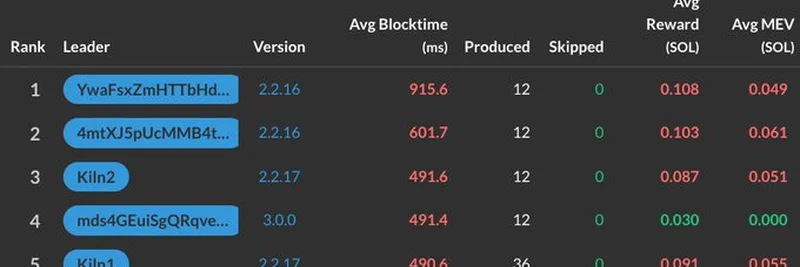Hey there, crypto enthusiasts! If you’ve been keeping an eye on the Solana blockchain lately, you might have noticed some chatter about slow validators causing delays. A recent post by Matthias Schmitz on X has sparked a lively discussion, and we’re diving into the details to break it down for you. Let’s explore what’s going on, why it matters, and what could be done about it.
What’s the Issue with Solana Validators?
Matthias highlighted a concerning trend: some Solana validators are intentionally slowing down their block times, with the top five offenders averaging nearly 1 second of delay. The image he shared shows a table of these validators, including their versions, average block times (in milliseconds), blocks produced, skipped blocks, and rewards in SOL. For example, the slowest validator, YwaFsxZmHTTbHd..., clocks in at 915.6 ms, while others like Kiln1 and Kiln2 also appear on the list with significant delays.
This isn’t just a minor hiccup. Slow block times can steal rewards from the next leaders and drag down the entire network’s performance. Validators are supposed to process transactions quickly to keep the blockchain running smoothly, but when they lag, it creates a bottleneck. Matthias even tagged Anza, the team behind Solana’s development, urging them to step in and fix this growing problem.
Why Are Validators Slowing Down?
So, why would validators deliberately delay? According to Matthias’ follow-up responses, the benefit for them is higher rewards per block. By stretching out their block production, these validators might maximize their earnings, even if it comes at the expense of the network. This behavior raises ethical questions, especially for stakers who rely on these validators to act in the community’s best interest. For instance, users pointed out Kiln (appearing twice in the top five) and questioned whether their stakers are aware of this tactic.
The Impact on Solana and Its Users
Slow validators don’t just affect the guilty parties—they impact everyone using the Solana network. Longer block times mean slower transaction confirmations, which can frustrate users and developers building on the platform. Plus, with rewards being siphoned off, it could discourage honest validators and hurt the network’s decentralization. This is a big deal for a high-performance blockchain like Solana, known for its speed and low costs.
Potential Solutions: Enter Alpenglow
The good news? The community is already buzzing about solutions. Several X users mentioned Alpenglow, a new consensus protocol being developed by Anza to supercharge Solana’s performance. Alpenglow promises to bring block finality down to around 150 ms, a massive improvement over the current setup. It builds on Solana’s existing strengths, like the Turbine data dissemination technique, and could help eliminate these slowdowns by optimizing how validators process blocks.
While Alpenglow isn’t live yet (users are asking “Wen Alpenglow?”), it’s a promising step forward. It could ensure validators can’t game the system for extra rewards and keep the network running at peak efficiency.
What Can You Do?
If you’re a Solana staker or just a curious blockchain fan, staying informed is key. Check out tools like the website Matthias linked (https://t.co/HmuIxU6SFQ) to monitor validator performance yourself. If you’re staking with a slow validator, you might want to consider switching to one with better performance to protect your rewards. And keep an eye on Meme Insider for the latest updates on Solana and other meme token-related news!
Wrapping Up
The slow validator issue is a wake-up call for the Solana ecosystem, but it’s also a chance to innovate. With community discussions heating up and solutions like Alpenglow on the horizon, there’s hope for a faster, fairer network. What do you think about this situation? Drop your thoughts in the comments, and let’s keep the conversation going!
Stay tuned to meme-insider.com for more blockchain insights and meme token trends!



